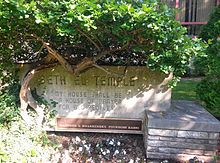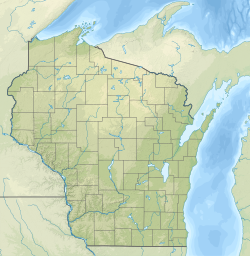Temple Beth El (Madison, Wisconsin)
| Temple Beth El | |
|---|---|
 Exterior of Temple Beth El | |
| Religion | |
| Affiliation | Reform Judaism |
| Ecclesiastical or organizational status | Synagogue |
| Leadership | Rabbi Jonathan Biatch |
| Status | Active |
| Location | |
| Location | Madison, Wisconsin |
| Country | United States |
Location in Wisconsin | |
| Geographic coordinates | 43°03′23″N 89°25′44″W / 43.0564°N 89.4288°W |
| Architecture | |
| Date established | 1939 (as a congregation) |
| Completed | 1950 |
| Website | |
| templebethelmadison | |
Temple Beth El, also known as Temple Beth-El, is a Reform Jewish congregation and synagogue, located in Madison, Wisconsin, in the United States. The congregation was founded in 1939.
History[edit]
The synagogue's founding rabbi was Dr. Manfred Swarsensky.[1] He was a Holocaust survivor who emigrated from Berlin, Germany, to the United States in 1939, established the synagogue with 12 members, and was the rabbi of Temple Beth El for 36 years, until his retirement.[1][2][3][4]
In 1950, when the synagogue had 150–200 families as members, it built the present synagogue building on land it had purchased on Arbor Drive, and dedicated the new building.[4][5] By the end of Swarsensky's tenure, the synagogue had 400 families as members.[4] The synagogue after his death created in his honor an annual lectureship, known as the "Swarsensky Weekend".[3]

Rabbi Kenneth Roseman, who has a Ph.D. in Jewish history, was the rabbi of the synagogue following Swarsensky, from 1976 to 1985.[4][6][7] He was followed by Rabbi Jan Brahms, who served for nineteen years before deciding in 2004 to take a post at a smaller congregation in The Woodlands, Texas. Brahms was known for his interfaith activities and for his many columns on religious topics for The Capital Times newspaper. During Brahms' tenure the congregation grew from 480 families to about 700.[8][9] After Brahms, Daryl Crystal served as rabbi on an interim basis until the current rabbi, Jonathan Biatch, took the position in 2005.[4][10]
Lawrence Kohn served as Education Director for 35 years, starting in 1979.[4][11][12] Henry James Cargas was the first Rabbi Manfred Swarsensky Scholar at the synagogue, in 1982.[2]
In 2008, the Madison Jewish Community Day School opened in rented space at Temple Beth El.[13] Beginning in February 2014, the synagogue hosted Beth Israel Center’s after-school services while renovations were underway at Beth Israel for six months.[14] The synagogue had to postpone a planned group trip to Israel scheduled for August 2014 due to fighting in Israel. Rabbi Biatch said: "There's a great deal of disappointment. But there is optimism that we will go eventually."[15]
In 2014, the synagogue had 650 member families.[4] The congregation is a member of the Union for Reform Judaism.[16] Its members reflect Madison’s demographic as the seat of state and county government, home of the University of Wisconsin, and a regional center for medical care, scientific research, and business.
Notable members[edit]
- Gabe Carimi, a former National Football League player[12][17][18]
References[edit]
- ^ a b Cohen, Leon (October 30, 2009). "New book captures dramatic life of Madison's Rabbi Swarsensky". The Wisconsin Jewish Chronicle. Archived from the original on April 2, 2015.
- ^ a b Cargas, Harry James (1989). Reflections of a Post-Auschwitz Christian. Wayne State University Press. p. 9. ISBN 0814320961.
Temple Beth-El.
- ^ a b Zolot, Marvin (2009). Mensch: Biography and Writings of Manfred Eric Swarsensky. ISBN 978-1438975450.
- ^ a b c d e f g Kleinman, Lynne (February 28, 2014). "Madison and Waukesha shuls celebrating 75th anniversaries". The Wisconsin Jewish Chronicle.
- ^ Goodwin, George M. (September 1998). "Wright's Beth Sholom Synagogue". American Jewish History. 86 (3): 325–348. doi:10.1353/ajh.1998.0020. S2CID 162284622.
- ^ Grant, Mary Lee (June 20, 2014). "Longtime rabbi at Congregation Beth Israel to retire". Corpus Christi Caller Times.
- ^ Baird, Mike (May 16, 2007). "Local rabbi writes book on Texas' Jewish heritage". Corpus Christi Caller Times.
- ^ Nowlen, Chuck (March 22, 2004). "Rabbi Put His Heart Into It: Temple Beth El's Brahms To Leave June 30". The Capital Times. Archived from the original on April 2, 2015. Retrieved March 17, 2015.
- ^ Waxman, Andrea (June 18, 2004). "Madison's Rabbi Brahms leaves Temple Beth El after 19 years". Wisconsin Jewish Chronicle. Retrieved March 17, 2015.
- ^ Daglas, Cristina (July 11, 2005). "Taking The Reins At Beth El: Education Is Priority For New Rabbi". The Capital Times. Archived from the original on April 2, 2015. Retrieved March 17, 2015.
- ^ Kohn, Lawrence (Fall 2009). "Spectators to Civilization's Destruction". Jewish Political Studies Review. 21 (3–4): 216–223. JSTOR 25834863.
- ^ a b Hirsch, Deborah (December 28, 2010). "Gabe Carimi: Star in shul and on the football field". Jewish Journal.
- ^ Cohen, Leon (August 7, 2008). "Madison launches Jewish day school". The Wisconsin Jewish Chronicle.
- ^ Erickson, Doug (February 23, 2014). "In the Spirit: Beth Israel Center to vacate premises for six months during renovation". Wisconsin State Journal.
- ^ Gebelhoff, Robert (July 24, 2014). "Concerned about safety, local tourists cancel Israel trips". Milwaukee Wisconsin Journal Sentinel.
- ^ "Directory of Congregations: Temple Beth El". Union for Reform Judaism. Archived from the original on April 2, 2015.
{{cite web}}: CS1 maint: unfit URL (link) - ^ Fryer, Bob (September 27, 2013). "'Jewish Hammer' on Bucs' offense". Heritage Florida Jewish News.
- ^ Fine, Jeremy (May 3, 2011). "The Bear Jew: Gabe Carimi". Jewish Journal.

